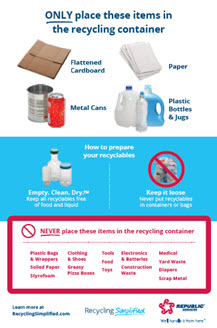As the world grapples with the challenges of plastic waste management, Republic Services, one of the largest waste management companies in the United States, has been at the forefront of innovative recycling solutions. With a strong commitment to sustainability and environmental stewardship, Republic Services has developed a robust plastic recycling program that aims to minimize waste, conserve natural resources, and promote a circular economy. In this article, we will delve into the details of Republic Services’ plastic recycling program, its benefits, and what it means for individuals, communities, and the environment.

The Plastic Recycling Process
Republic Services’ plastic recycling program begins with the collection of recyclable materials from households, businesses, and community recycling centers. The company operates a network of recycling facilities across the country, where collected materials are sorted, processed, and transformed into raw materials that can be used to manufacture new products. The plastic recycling process involves several key steps:
- Collection: Republic Services collects recyclable plastics from various sources, including curbside collection programs, drop-off centers, and commercial recycling programs.
- Sorting: Collected plastics are sorted based on their type, including polyethylene terephthalate (PET), high-density polyethylene (HDPE), polyvinyl chloride (PVC), low-density polyethylene (LDPE), polypropylene (PP), and polystyrene (PS).
- Cleaning: Sorted plastics are cleaned to remove contaminants, such as food residue, labels, and caps.
- Shredding: Cleaned plastics are shredded into small pieces, known as "flakes," which are easier to process and transport.
- Pelletizing: Flakes are melted and formed into small pellets, which can be used as raw materials for manufacturing new plastic products.
Types of Plastics Accepted
Republic Services accepts a wide range of plastics for recycling, including:
- Bottles and jars: PET and HDPE bottles and jars, such as soda bottles, water bottles, and detergent containers.
- Containers: Plastic containers, such as yogurt cups, margarine tubs, and cottage cheese containers.
- Bags and wraps: Plastic bags, wraps, and film, such as grocery bags, bread bags, and plastic wrap.
- Plastic lumber: Plastic lumber, such as decking, fencing, and outdoor furniture.
Benefits of Plastic Recycling
Republic Services’ plastic recycling program offers numerous benefits, including:
- Conservation of natural resources: Recycling plastics helps conserve non-renewable resources, such as oil and natural gas, which are used to produce virgin plastics.
- Reduced greenhouse gas emissions: Recycling plastics reduces the need for producing new plastics, which requires significant amounts of energy and generates greenhouse gas emissions.
- Decreased waste: Recycling plastics helps minimize waste sent to landfills, where it can take hundreds of years to decompose.
- Job creation: The plastic recycling industry creates jobs and stimulates economic growth in local communities.
- Closed-loop production: Recycling plastics enables the production of new products, such as packaging materials, automotive parts, and construction materials, which helps to reduce waste and promote a circular economy.
Challenges and Opportunities
Despite the benefits of plastic recycling, there are several challenges and opportunities that Republic Services and the industry as a whole need to address:
- Contamination: Contaminated plastics, such as those with food residue or liquids, can ruin entire batches of recyclables and make them unusable.
- Market fluctuations: Fluctuations in global market demand and prices for recyclable materials can affect the economic viability of plastic recycling programs.
- Infrastructure development: Developing and maintaining recycling infrastructure, such as sorting facilities and processing plants, requires significant investment and resources.
- Public education: Educating the public about what can and cannot be recycled, as well as the importance of proper recycling practices, is crucial for the success of plastic recycling programs.
Frequently Asked Questions (FAQs)
- What types of plastics can I recycle?
Republic Services accepts a wide range of plastics, including PET, HDPE, PVC, LDPE, PP, and PS. - Can I recycle plastic bags and wraps?
Yes, Republic Services accepts plastic bags and wraps, including grocery bags, bread bags, and plastic wrap. - How do I prepare my plastics for recycling?
Rinse your plastics, remove labels and caps, and flatten them to make them easier to process. - What happens to my recyclables after they are collected?
Collected recyclables are sorted, processed, and transformed into raw materials that can be used to manufacture new products. - Can I recycle plastics with food residue or liquids?
No, contaminated plastics can ruin entire batches of recyclables and make them unusable. Please rinse your plastics before recycling them.
Conclusion
Republic Services’ plastic recycling program is a vital component of the company’s commitment to sustainability and environmental stewardship. By collecting, sorting, and processing recyclable plastics, Republic Services helps conserve natural resources, reduce greenhouse gas emissions, and promote a circular economy. While there are challenges and opportunities that need to be addressed, the benefits of plastic recycling are clear. By working together, individuals, communities, and businesses can make a significant impact on reducing waste, conserving resources, and promoting a more sustainable future. As Republic Services continues to innovate and expand its plastic recycling program, we can all play a role in supporting this important effort and creating a better world for generations to come.
Closure
Thus, we hope this article has provided valuable insights into Republic Services Plastic Recycling: A Comprehensive Guide. We appreciate your attention to our article. See you in our next article!